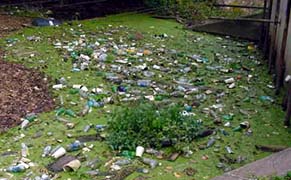
Litter discovered by members of the Carthage High School Stream Team reflects local disregard for preserving the environment
Many citizens appear to be pessimistic over what will be done to protect their children or grandchildren from the devastation that will be caused by lack of potable water. And not until Southwest Missouri becomes a desert, they say, will the government step in to deal with water issues, like it had to do in Pitcher, OK because of that area's lead and mercury contamination. But these same people in the mainly Republican communities that comprise the Jasper County watershed refuse to do anything to stop officials from making decisions in support of economic interests over public health.
This sense of apathy by the community was shown Wednesday night when only a spinkling of residents attended a public forum organized by members of the Carthage High School Stream Team and their mentors. They met last night in the Carthage High School Auditorium to announce the results of their two-year study conducting water sampling of the Spring River.
And their results were not good. In fact, the team was so alarmed over the spikes in levels of E. coli bacteria that they found in several test sites around Carthage that they plan to post signs at popular swimming areas regarding the risk of full body contact with the water.
R-9 substitute teacher Frank Martinez who specializes in biology and one of four adult sponsors said the team used the same testing methods as the EPA, a relatively new procedure that provided, what he called, "simple to read, good data" available within 24-hours of sampling.
E. coli, as well as fecal coliform are bacteria whose presence indicates that the water may be contaminated with human or animal wastes. Disease-causing microbes (pathogens) in these wastes may pose a special health risk for infants, young children, and people with severely compromised immune systems. Symptoms for adults include diarrhea, cramps, nausea, and headaches.
"Kansas and Oklahoma should be concerned over what's coming their way," was Wayne Christian's warning. A physics teacher and team mentor, Christian lamented over what has become of the Spring River and said that today he wouldn't be happy over eating fish caught in its waters.
In mentioning "chronic diarrhea," Christian told the audience, that from a community health standpoint, he would "hate to think it was part of their natural life." "The river should be declared unusable," he enunciated.
Of the half dozen sites monitored, the "Bottoms," an area south of town was deemed the most bacteria-laden. "It has been like this for some time, Christian said," adding that a determination had to be made whether the bacteria was from animal or human waste. With new grant monies the group hopes to purchase equipment in order to conduct an Enterococci test to better determine the bacterial origin. Walking the stream failed to determine whether the source of pollution was a sewer line. Monies for a wireless weather station to help make data sampling more accurate already has been secured from the Helen S. Boylan Foundation of Carthage.
Both men talked of how they were ostracized by the Missouri Department of Natural Resources last year even in light of MDNR test results coming close to matching their own. Martinez stressed that releasing their findings was not meant to make enemies but to create community awareness. "Everybody should have responsibility for stewardship," Christian added.
Power point presentations were made by Kate Kennedy and Rebekah Davis, Briana Russo, Natalie Lingenfelter (who was interviewed by KOAM-TV), and Clint Wilkerson and Mark Buchheit. Their main focus, besides describing the methodology for testing the water and the resulting indicators, was to graphically show how the tributaries of the Spring River have become tarnished from pollution--including dumped garbage--taking away from the enjoyment of all. Also in attendance representing the team were Autumn Parker, Randy Ayres and Doug Snodgrass.
From the audience Bill Miller, a water activist from Newton County, said that the group's findings were good baseline data for the future, especially with the movement of litter up north out of the impaired Elk River Watershed. Miller also spoke of how a fish hatchery he worked for was able to meet its state's mandate for lower phosphate levels after hiring a specialist to look over the issue. What he was alluding to was that everyone contributing to the level of pollution can lessen their impact by working at it.
In assessing whether citizens will accept responsibility led Martinez to remind everyone of the old adage, "You can lead a horse to water, but you can't make him drink." Perhaps, that horse knows something humans are unwilling to accept.
For a previously posted article, "Swimming in your toilet," click here.






Comments